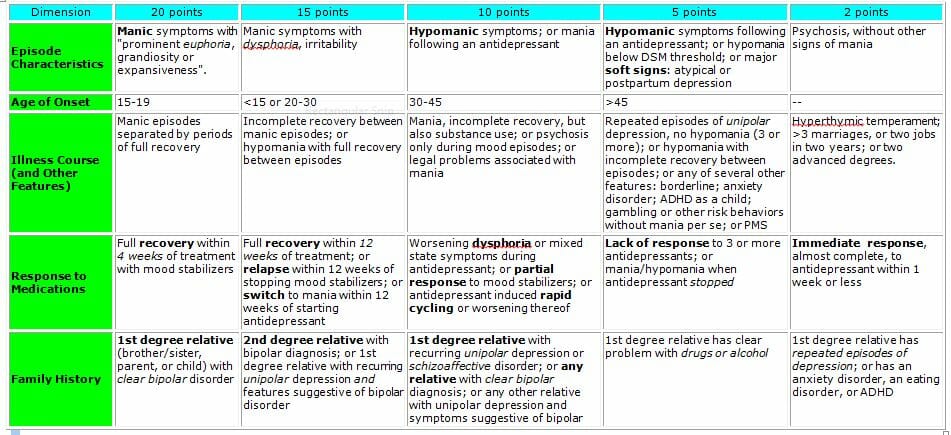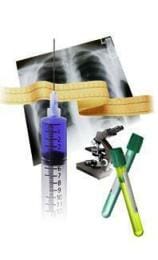Am I bipolar? You may be asking yourself this because:
1. You have tested positive on a bipolar test.
2. You may have learned about bipolar symptoms such as alternating mood swings, from mania to depression, and thought “this is me”.
3. You may have been labeled “bipolar” by someone else or someone close to you has suggested it.
4. You may identify with one or more of the many famous people with bipolar disorder, again thinking “this is me” or “this explains
everything”.
5. You may have been diagnosed as such by a psychiatrist, your family doctor, or another medical expert.
6. You may have received some other diagnosis, for example Major Depressive Disorder, ADHD or Borderline Personality Disorder and you are finding that your medication and other treatment is not helping.
Regardless of your experience, you need an answer! Here is how The Bipolarity Index (a tool developed by Harvard researchers) can help you know not just “Am I Bipolar?”, but also “Just How Bipolar Am I?”.
Reminder
An excellent clue that you have the wrong diagnosis is if your medication is not alleviating your symptoms.
More and more clinicians who specialize in bipolar and other mood disorders believe this is a spectrum disorder, meaning it is not a
YES/NO answer, but a matter of degree. For example, you could have classic Bipolar I, the milder Bipolar II, or a softer form that does not
meet a clinical threshold or require medication to treat the symptoms.
Your bipolar profile
Consider these two people who are both asking themselves “AM I BIPOLAR?” At one extreme is Person A with the following profile:
- Has manic episodes characterized by euphoria, grandiosity, or expansiveness.
- Developed their bipolar symptoms in their late teens at around age 19.
- In between mood episodes experiences full recovery and returns to normal self.
- Takes mood stabilizing medication and responded well with meds leading to a remission in bipolar symptoms after approximately 4 weeks.
- The person’s mother also has bipolar disorder.
The profile above seems to leave little doubt and we can be pretty sure that yes, Person A does indeed have bipolar disorder. Contrasts this “textbook” bipolar profile of Person A above with Person B:
- Mild hypomania but not full blown mania.
- Developed their symptoms in middle age at around age 47.
- Often depressed and also suffers from anxiety. Also often agitated and irritable.
- Has tried a few different antidepressants but so far no meds have helped.
- Has no relatives diagnosed with bipolar disorder but Dad is an alcoholic.
Does Person B also have bipolar disorder? It is certainly possible but is relatively unlikely. Why do I say this? These hypothetical profiles are based on the Bipolarity Index . . .
Using the Bipolarity Index to answer “Am I Bipolar?”
The Bipolarity Index was developed by Harvard researchers and measures 5 distinctive dimensions of the illness:
1.The characteristics of your mood episodes, such as whether you have experienced full mania or (milder) hypomania?
2. Age of onset. (Bipolar usually manifests in the late teens or, almost as often, in the early 20s. It is much less frequent in old people or young children or “tweenies”.)
3. Course of illness: For example, do you follow the “typical”pattern of distinct episodes of mania and depression, as well as periods where you are well and “back to normal”?
4. Response to medications. Sometimes people complain that mood stabilizers do not work for them. However, if mood stabilizers are not working, it is statistically much more likely that you do not have bipolar disorder as opposed to having the more rare, treatment resistant kind.
5. Family history. This is an illness with a strong inherited component. If a parent or sibling has bipolar disorder, it is more likely you do as well. By the same token, absolutely no family history anywhere makes the diagnosis more unlikely.

You can score the Bipolarity Index yourself. A score of 60 or higher usually correlates with Bipolar I. The lower your score, the milder your degree of “bipolarity”. If you score under 10, the answer to AM I BIPOLAR is probably a NO!
Pros and cons of bipolar self screening tests
Anyone asking “Am I bipolar” can easily do a bipolar disorder self test to check their bipolar symptoms.
However, any preconceived notions you have about bipolar symptoms and your diagnosis can distort the results. This is why the checklist approach, as well as relying on self-reporting, can never yield a conclusive result.1
There is no physical test, such as a blood test for Bipolar Disorder. Also, there is no genetic testing for bipolar disorder. In other words, you cannot take a definitive, objective bipolar test, but must rely on experience and educated judgement instead.
Moving beyond the bipolar test
Please do not think I am dismissing bipolar tests, especially the well-established tests compiled by reputable experts and confirmed through rigorous empirical scientific research.
I actually have several of these on this Bipolar Lives website, and encourage anyone who has ever asked themselves, “Am I bipolar?”, or who suspects a mood disorder in someone close to them, to take at least one, and probably two or three tests.
However, at the end of the day these are still just checklists based on self-reporting. They are guidelines that merely SCREEN for the POSSIBILITY, not definitive diagnostic tools, and CANNOT, in themselves, diagnose bipolar disorder in you or anyone else.
Anyone who scores positive on such a test needs to consult with an expert immediately. Preferably this would be a licensed mental health professional (e.g. a board certified expert psychiatrist, a psychologist) with extensive experience in bipolar and other mood disorders.
One reason for undergoing a diagnostic evaluation is to get treatment, such as a prescription for a mood stabilizing medication. However, getting medication is a secondary reason. The main reason is to CONFIRM THE DIAGNOSIS!
A skilled clinician will do much more than administer a paper and pencil checklist. As well as tests just like the bipolar tests we have just looked at, there needs to be a conversation. This will involve various techniques and elements, depending on the doctor. All of them will probably ask about family history and your family members as bipolar disorder has a strong genetic component. EVERY expert should ask you about POSSIBLE, as well as diagnosed, bipolar family members.
Many professionals may ask you to bring along a trusted third person that knows you very well and over a long period of time. This helps to confirm certain bipolar symptoms, to fill in blanks, help you remember important info that your doctor discusses with you about the disorder, which is known as psychoeducation, and to help you by providing further perspective.
Another important technique in diagnosing bipolar is the Life Chart. Having the trusted third person present can be most useful in creating the Life Chart. This chart is a diagram that starts at birth and records significant life events alongside a mood scale. In this way it is possible to get an overall picture of both mood episodes and other bipolar symptoms, and possible triggers for episodes of depression and mania.

Also, certain physical tests are required. Lab work and other tests will be needed to rule out diseases such as thyroid conditions (looks like bipolar and often co-occurs with bipolar disorder), diabetes, Lyme disease, and quite a few others.
My own bipolar diagnosis happened through pure chance. My psychiatrist and I both believed I had major depression and also acute anxiety. In passing I mentioned some shopping I had done on the weekend. When my shrink discovered that I had spend over $5,000 (I was a full time grad student at the time and should have been living frugally) on exquisite European furniture for my cheap one bedroom student apartment, there was a diagnostic breakthrough.
This kind of irrational spending spree is a classic symptom of mania. It didn’t take long to uncover many other manic episodes and my diagnosis was finally accurate and helpful. I have never looked back!
Bipolar behavior
There are many dimensions to “being bipolar” and pop culture does not convey enough accurate info on the disorder for us to understand genuine bipolar symptoms.
First and foremost there are bipolar feelings and moods – and of course mood swings. There is also what we could call “bipolar thoughts”. And as those of us who have lived with bipolar for a while know, there is that pesky (sometimes ruinous) bipolar behavior. A reliable diagnosis requires a very careful balance of examining all three of these: feelings, thoughts, and bipolar behavior.
Although there is an inner experience of mood that is possibly the ultimate arbiter of “Am I Bipolar?”, focusing to some extent on potential bipolar behavior is inevitable because this is what is measurable and observable to other people – and what will create serious and destructive real world consequences if not addressed.
The main danger of misdiagnosis arises because bipolar behavior can closely resemble other mental health conditions. Researchers in Rhode Island discovered that many patients diagnosed as bipolar actually had borderline personality disorder instead. In fact, it appears to be becoming one of the most common misdiagnosis traps.
How to tell? Bipolar disorder is episodic, whereas borderline personality is a more pervasive and constant state.
After beginning treatment, Am I Bipolar? will answer itself in that if mood stabilizers make you “better” (i.e., they remove significantly reduce or even eliminate bipolar symptoms) then Bipolar Disorder is probably the underlying condition.2
However, consider that if the traditional bipolar disorder treatment of mood stabilizers does not help, then maybe the simple answer is “No, you are NOT bipolar!“
You need to track your moods with a mood chart to see if you have the highs and lows – that is both the manic swings and the depressive swings – that are the hallmark of this illness.
Or take our online test, and if you screen positive see a board certified or licensed expert on mood disorders.
Finally, make sure you get educated. This excellent summary from the University of Maryland will gives you an easy to understand and very accurate and insightful bipolar disorder overview.
References:
1https://www.everydayhealth.com/emotional-health/bipolar-disorder/10-warning-signs-bipolar-disorder/
2https://www.blackdoginstitute.org.au/clinical-resources/bipolar-disorder/bipolar-disorder-self-test
 Medically reviewed by
Medically reviewed by
2 Comments
i have bi- polar problems since 16 with acute manic phases starting at 25. I accepted problem only at 22 and took lithium. This helped to not go manic but dampened my life somewhat. Last week read about OCD which seems a close match to my problems. Especially ‘hoarding’ i call it hamstering, where I collect all sorts of thing with fairly good reason at the time, but not later, In pockets boxes shelves etc. Sometimes i find things months later. this repeats itself in manic phases and often a very fast rate of collection.
Is it possible to become bi polar at the age of 63?